- Home
- Jeremy Robinson
Forbidden Island
Forbidden Island Read online
FORBIDDEN ISLAND
By Jeremy Robinson
Description:
SEEKING TO CONTACT HUMANITY’S LOST TRIBE…
On the precipice of a cliff, contemplating suicide, dishonorably discharged U.S. Army Ranger, Rowan Baer, is invited to provide security to a research team visiting the most dangerous island in the world—North Sentinel Island in the Sea of Bengal. Seeking redemption, he accepts.
Living among Amazon rainforest tribes, eccentric Israeli anthropologist, Talia Mayer, is recruited to study the island’s elusive inhabitants—the Sentinelese—who have resided on the tropical island since the dawn of mankind. Seeing the chance of a lifetime, she joins the team.
On the run from his past, Palestinian linguist, Mahdi Barakat, is given little choice: join the expedition and make contact with the Sentinelese, or be left to face the men tracking him down. Afraid for his life, he finds safe harbor halfway around the world.
As part of an expedition funded by the Indian government and supported by a local resort millionaire, the team struggles to make contact with the Sentinelese, a tribal people renowned for their violence, strange behavior, and mysterious ways. But when the expedition’s yacht strikes a reef, and sinks, the team finds themselves stranded on an island few people have ever set foot on and survived, an island that they quickly discover is home to far more than primitive tribal people.
…THEY UNCOVER THE VERY SOURCE OF EVIL.
Jeremy Robinson has been compared to both Matthew Reilly and Stephen King, and with Forbidden Island, he brings the characters and plotting of the fastest paced thrillers together with mind-bending horrors of which only an imagination like Robinson’s can conceive.
FORBIDDEN ISLAND
Jeremy Robinson
Older e-reader? Click here.
Table of Contents
PROLOGUE
1
2
3
4
5
6
7
8
9
10
11
12
13
14
15
16
17
18
19
20
21
22
23
24
25
26
27
28
29
30
31
32
33
34
35
36
37
38
39
40
41
42
43
44
Epilogue
A NOTE FROM JEREMY
ACKNOWLEDGMENTS
ABOUT THE AUTHOR
ALSO by JEREMY ROBINSON
For the RobinsonFest attendees.
May you never find yourself on the Forbidden Island.
PROLOGUE
North Sentinel Island,
The Bay of Bengal, 1981
The setting sun made Mike Pastore nervous, not because he feared the coming darkness, but because the wild men preferred it.
The Primrose, a two-hundred-fifty-foot cargo ship out of Hong Kong, had run aground five days earlier, when a monsoon had heaved the ship upon the sharp reefs surrounding the island. Pummeled by relentless twenty foot waves, the vessel had been shoved to within a hundred feet of the sandy beach.
During the first two days, as the rains drifted toward India, the glowing sands looked empty and inviting; the lush jungle beyond promised shade and the thrill of exploration. If not for the still violent waves, the crew would have vacated the floundering vessel, and set up on dry land, to wait for rescue.
But on the third day, when the waves became manageable, they arrived.
Pastore had been on watch as the sun rose, a solitary guardian while the crew slept, ignorant to the danger. As one of three crewmembers who was not Chinese, he got ‘shit duty’ a third of the time.
A shiver ran through Pastore’s body as he remembered the first native he’d seen. The man walked out of the jungle in a squat. His strange position, small stature and dark skin had convinced Pastore that he had discovered some kind of island-dwelling chimpanzee. Lured by intrigue, he had left the wheelhouse and stepped onto the starboard-side main deck, binoculars in hand. The memory was still fresh, and he didn’t so much remember it as relive it in his mind.
The native wobbled across the shoreline, eyes on the ship. As soon as Pastore put the binoculars to his eyes and focused on the man, he’d stood to his full five-foot-tall height. By Pastore’s normal standards, the man was far from intimidating, but the way he stared across the water, right at Pastore…
Save for a yellow band wrapped around the man’s head, and another around his waist, the native was naked. Pastore watched the man, who remained rooted in the sand, for a full two minutes before raising his hand in greeting.
That was his first mistake.
His second was not immediately rousing the captain and crew—not because it would lead to tragedy, but because no one believed the tale of what he saw next.
The native man lifted his penis, spread his legs and stroked his genitals several times. While the man was clearly primitive, the gesture easily translated between ancient and modern cultures as something like, ‘Fuck off.’
As the man gyrated, a woman emerged from the jungle shade, bow and arrows in hand. She wore a circlet of leaves around her head, and a beige band around her waist, from which a small pouch hung. Though her features, lost in the darkness of her skin, were hard to see, her appearance was that of a teenager. The subtle swell of her belly hinted at pregnancy.
The man took the long bow, nocked an even longer arrow, aimed high, and let it fly. Pastore ducked, clutching his head, as the featherless arrow fell short and thunked against the metal hull.
Upon collecting himself, Pastore looked up over the rail and found the man dancing, legs spread wide, bouncing back and forth, from foot to foot. When the man completed his display, the woman approached him from behind, wrapped her arms around his waist and took hold of his penis. At first, it appeared she was simply borrowing the man’s member to repeat his rude gesture, but then the man grew excited.
What happened next kept Pastore from moving, or even thinking to wake his shipmates. The woman slipped around in front of her partner. Hands on knees, she leaned forward and stared out at Pastore as the man began to thrust. Looking through his binoculars, Pastore watched the pair copulate, their eyes, lacking any signs of pleasure, fixated on him.
And then, they were not alone. Six couples emerged from the jungle and began having sex, all eyes on Pastore. It was not an orgy. It wasn’t even passionate. It was a defiant claim, the carnal act declaring, ‘This belongs to us, not you.’
The couples finished without any fanfare or shouted orgasms. They simply retreated back into the jungle, disappearing into shadows, and breaking Pastore from his spell.
Pastore summoned captain and crew to the deck, but not a single native was seen for the remainder of the day, resulting in a strong rebuke. His crewmates believed his story to be the tired fantasy of a bored and lonely man. That night, as punishment, he was once again assigned an eight hour watch, starting at midnight.
It wasn’t until 4am that he spotted signs of life again.
When he awakened the captain, he was met at first by near violence—being run aground and stranded by a monsoon had everyone on edge. But when the captain entered the wheelhouse and saw the orange glow of a dozen fires just inside the fringe of the jungle, he had gathered the rest of the crew himself.
They watched the small blazes flickering th
rough the night, but detected nothing more. No chanting or tribal drums. No sounds of work being done. No smell of cooking meat. The fires, like the primal sex act, felt like a warning. A display of power. Beware. We have fire.
Two days had passed since the fires first appeared and with every passing hour, the natives had become more and more brazen. The crew had counted fifty nearly nude warriors patrolling the beaches, armed with bows and spears, but the shadows underneath the jungle canopy appeared to be composed of animated darkness, shifting not with the wind, but with a kind of living motion.
How many of them are there? Pastore wondered.
The warriors launched volleys of iron-tipped arrows, none of which found their mark. Pastore believed the men were simply trying to intimidate the crew while they constructed three small vessels. Once completed, the warriors would be able to reach the Primrose and her crew, who were armed with two axes, a small collection of knives, and a flare gun. They were outnumbered and outgunned.
The Primrose’s crew, like those of many cargo vessels, worked hard, but were more likely to spend a free day playing cards and drinking than exercising or taking part in any kind of hunt—unless it was for more liquor. Not one of them had taken a life, and only a few had traded fists in a bar fight. If even a handful of the savages boarded the ship, the crew would be in grave danger.
With that knowledge, the captain sent a distress message, stating the situation as plainly as possible. “Wild men, estimate more than 50, carrying various homemade weapons, are making two or three wooden boats. Worrying they will board us at sunset. All crew members’ lives not guaranteed.”
The message had been sent out with the rising sun, which revealed three nearly completed vessels, each long enough to carry ten men. The fifty warriors stood naked and sentinel, watching the crew until the sun cleared the horizon. Then they retreated into the shadows, the captain believed, to rest before night returned.
And Pastore agreed. While the tribe was certainly active during the day, the nights had become more and more fervent. The campfires became bonfires. A strange, acrid smoke swept over the ship, carried by the ocean breeze. Men and women shouted in their strange tongue. The sounds of wood being cracked, carved, and bound filled the night. It made staying alert during the long watch easy, but it left Pastore beyond exhausted each morning.
The ship’s deck was patrolled at all times. Thirty three crewmen, minus the captain, chief engineer, and chief mate had been divided into groups of ten, each taking an eight hour shift. Pastore remained on the night watch, but he’d been put in charge, and even better, he wasn’t alone. But the terrified men with him still did little to ease his own fears.
What if the Captain is right?
What if they come tonight?
Pastore was a father of two sons, ages five and three. His wife, Amanda, was a hard woman to love at times, but he did. She put up with his long absences and was more faithful than any woman should be to a man of Pastore’s obvious faults. On the surface, he was disheveled and portly. He preferred lite beer, cheap cigars, and the seedy bars in which those vices were normally enjoyed. But she somehow saw through all that, to the gentle man who adored his sons, worked hard to give them a home and a future, and always came home from a voyage with gifts.
He looked west, where the setting sun silhouetted the wheelhouse. Darkness would claim the sky within thirty minutes. His watch didn’t begin for another four hours, but he found himself compelled to remain on deck, watching the beach for signs of life.
Aside from the three small boats, there was no sign of the wild men.
“Maybe they’re not coming back?” a man named Stack asked. He wasn’t on watch, either, but he had taken a break from gambling to give his pale skin some time in the sun, albeit dim. Or so he said. Pastore knew better. Like the other fifteen men on deck, Stack had come to assess the situation for himself, to determine if they would be attacked, and if so, perhaps take some time to plead with God for mercy, or perhaps for forgiveness.
Pastore would do neither. As one of the men with more to live for, he had volunteered to carry one of the two axes. And to see his family again, he would use it. There was no spear on this island that could stand up to its steel blade.
Pastore looked past a line of worried Chinese men and caught Stack’s eye. “They’re coming back.”
“You an expert on the natives now? Just cause you seen them hump’n?” Stack sneered a bit. “Wasn’t for you, we’d—”
“Shut it,” Carson said. He was a big, bald, black man, whose skin was pale compared to the wild men. As the only real fighter on the ship and the recipient of the second axe, when he spoke, people listened. “Pastore didn’t run us aground. That was the monsoon. And he surely didn’t populate this island with savages. So unless you want to learn how they react to a man thrown overboard, I suggest you hush.”
After that, no one spoke. Not because Carson had put the fear of God into them, but because the long shadows cast by the setting sun had come to life, ebbing and flowing as something, or several hundred someones, moved about.
Pastore waited for the first fire to be rekindled. But the island remained dark. As the sky turned purple, and then black, the island slipped into darkness. If not for the crashing of waves upon its shore, he would have believed the island had been plucked from the Earth.
As the night settled and the moon’s sliver of light did little to change the situation, curiosity made way for fear. Everyone not on the early night watch retreated to the safety of the decks below, where even doors without locks might stymie primitives who had never seen such things.
But not Pastore. He stood by Carson’s side, eyes trained toward the unseen island.
They stood there like that, waiting and listening, for hours.
But the world remained calm and silent.
The wild men weren’t living up to the name bestowed on them by the captain.
As 4:00 am rolled around, with just over an hour before the sun’s return, Pastore dared to hope that the natives had given up. Perhaps they had realized that the crew was stranded, no more capable of retreating from the island than they were willing to land on its unspoiled shores. All of the fired arrows and crude boat building could have simply been bravado, much like the strange sex act Pastore had witnessed: designed to repulse. Ancient psychological warfare.
Perhaps, he ventured further, they were no threat at all.
“Quiet,” Carson said.
Pastore hadn’t been talking, but he held his breath. He heard nothing aside from the rhythmic, now-calm surf, lapping against the hull below and the distant sands. A hushed conversation slipped through the night, coming from the bow, where three men, one of them Stack, stood watch. Pastore couldn’t see them in the abject darkness, but he had stationed the men there. Did they hear something, too?
“What did you—”
“Shh!” Carson was visible as a subtle shadow, lit by the Milky Way’s dull glow, but Pastore could see tension in the man’s stance.
A sound like a bird, wings pumping, fluttered past.
They had observed a large number of bird species during the daylight hours, flitting between trees, chirping a variety of songs. But the small creatures had never left the canopy, and they had certainly never approached the ship.
It wasn’t a bird, he realized. He’d heard the same sound just before that first warrior’s arrow had struck the hull.
Pastore ducked down. “They’re firing arrows!” His shout cut through the night and sent many more men running for cover, including Carson.
“You said they couldn’t reach the deck from shore,” the big man complained.
“They’re not on the shore,” Pastore said, breathing heavily, heart pounding. Their worst fears had been realized. The wild men were coming.
Another fluttering arrow flew past.
They’re going to board the Primrose.
Kill us all.
Make trophies of our skulls, or eat us!
“Lights!” Carson shouted so loud that Pastore let out a yelp.
A moment later, the ship’s extinguished deck lights blazed to life. Aside from lighting the ship and the water immediately around it, the lights did little else than reveal the crew to the islanders. So they had been turned off, giving both sides the cover of darkness, though only the wild men preferred it.
And if they had piloted their small ships through the surf, in the black of night, Pastore had no doubt they could see in the dark, too. Aside from the whites of their eyes, the wild men were the dark.
Carson gripped Pastore’s arm hard enough to hurt. “We stand together. We fight together.”
Pastore nodded, but he said nothing, mentally adding, We die together. He had much to live and fight for, but his heart lacked the same boldness, though he suspected Carson’s bravery was little more than an act to maintain his reputation. Then the man stood, proving him wrong, and yanked Pastore up with him.
They looked over the starboard rail. Under the stark glow of the ship’s light, the shallow waters should have shimmered back at them, revealing reef and fish. Instead, it was a wall of darkness, as though the ocean was still lost in shadow.
“What…” Pastore said, and then he saw a familiar set of eyes staring back at him. The warrior from the beach, now smiling. “It’s them.”
All at once, hundreds of heads turned upward, their white eyes glowing.
They didn’t need the boats, Pastore realized. They can swim.
Movement drew his eyes toward the bow.
A wave of humanity was scaling the hull. Pastore’s breath caught. There was no ladder there. He saw no rope. And yet, the wild men were making short work of the climb to the gunwales.
The men stationed at the bow saw it, too, and they began screaming for help. Help with what, Pastore wasn’t sure, because each and every one of them retreated. Stack was among them, his voice several octaves higher than usual. “Inside! We can’t stop them!”

 Alter
Alter From Above - A Novella
From Above - A Novella Flux
Flux Tether
Tether Exo-Hunter
Exo-Hunter Pulse
Pulse Cannibal
Cannibal Omega: A Jack Sigler Thriller cta-5
Omega: A Jack Sigler Thriller cta-5 Flood Rising (A Jenna Flood Thriller)
Flood Rising (A Jenna Flood Thriller) Viking Tomorrow
Viking Tomorrow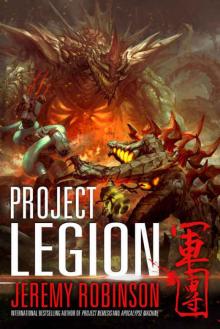 Project Legion (Nemesis Saga Book 5)
Project Legion (Nemesis Saga Book 5) BENEATH - A Novel
BENEATH - A Novel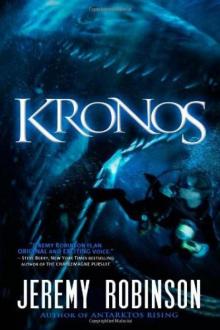 Kronos
Kronos SecondWorld
SecondWorld XOM-B
XOM-B Forbidden Island
Forbidden Island Project Maigo
Project Maigo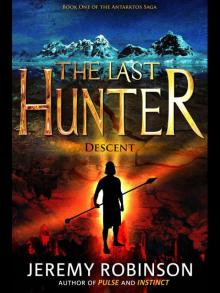 The Last Hunter - Descent (Book 1 of the Antarktos Saga)
The Last Hunter - Descent (Book 1 of the Antarktos Saga)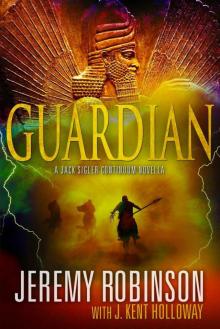 Jack Sigler Continuum 1: Guardian
Jack Sigler Continuum 1: Guardian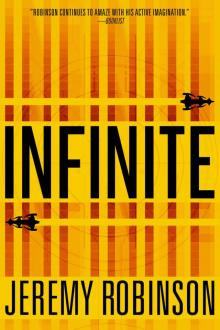 Infinite
Infinite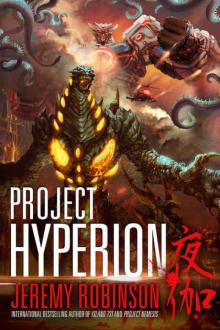 Project Hyperion
Project Hyperion The Distance
The Distance The Divide
The Divide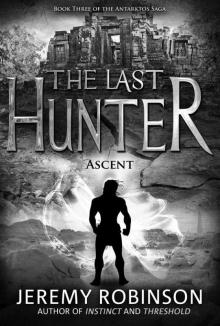 The Last Hunter - Ascent (Book 3 of the Antarktos Saga)
The Last Hunter - Ascent (Book 3 of the Antarktos Saga)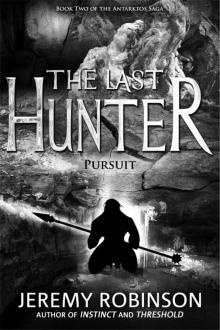 The Last Hunter - Pursuit (Book 2 of the Antarktos Saga)
The Last Hunter - Pursuit (Book 2 of the Antarktos Saga)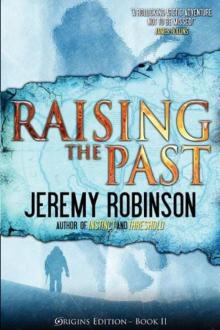 Raising the Past
Raising the Past The Others
The Others The Last Hunter - Collected Edition
The Last Hunter - Collected Edition Threshold
Threshold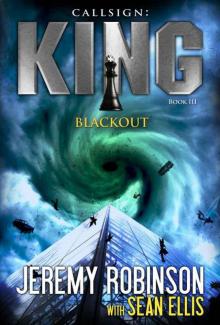 Blackout ck-3
Blackout ck-3 Antarktos Rising
Antarktos Rising Viking Tomorrow (The Berserker Saga Book 1)
Viking Tomorrow (The Berserker Saga Book 1) The Didymus Contingency
The Didymus Contingency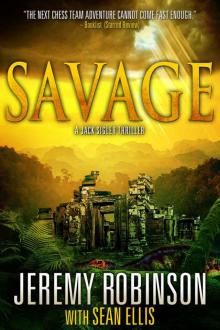 Savage (Jack Sigler / Chess Team)
Savage (Jack Sigler / Chess Team)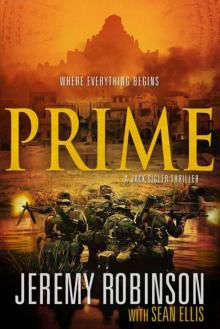 Prime
Prime Insomnia and Seven More Short Stories
Insomnia and Seven More Short Stories Empire (A Jack Sigler Thriller Book 8)
Empire (A Jack Sigler Thriller Book 8) Unity
Unity Instinct
Instinct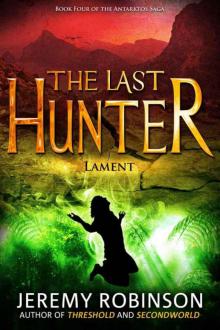 The Last Hunter - Lament (Book 4 of the Antarktos Saga)
The Last Hunter - Lament (Book 4 of the Antarktos Saga) MirrorWorld
MirrorWorld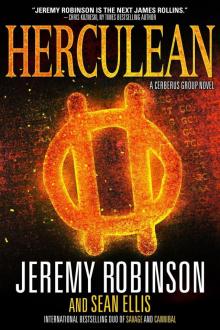 Herculean (Cerberus Group Book 1)
Herculean (Cerberus Group Book 1) Island 731
Island 731 Omega: A Jack Sigler Thriller
Omega: A Jack Sigler Thriller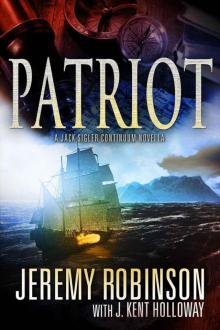 Patriot (A Jack Sigler Continuum Novella)
Patriot (A Jack Sigler Continuum Novella)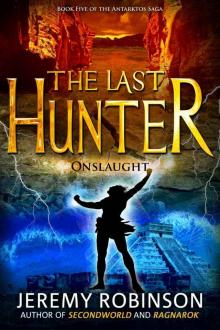 5 Onslaught
5 Onslaught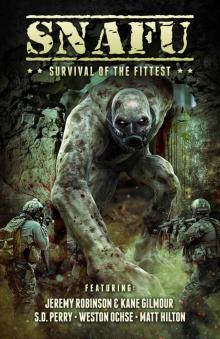 SNAFU: Survival of the Fittest
SNAFU: Survival of the Fittest Helios (Cerberus Group Book 2)
Helios (Cerberus Group Book 2)